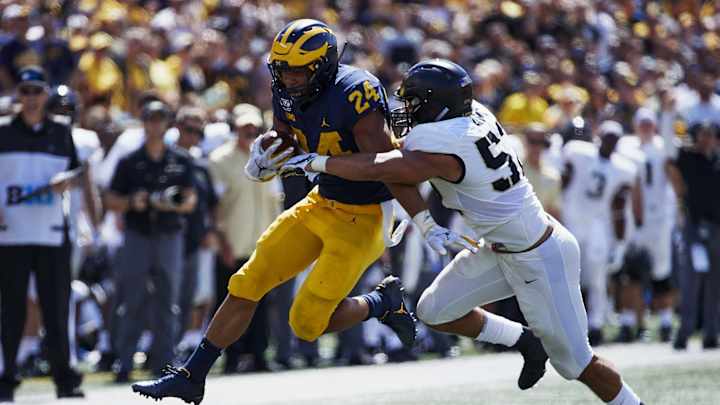2019 Review: Defending The Triple-Option Had Grave Consequences For Michigan

Pre-Game Expectations: Following an 11-2 campaign in 2018 that concluded with a 70-14 win over Houston in the Armed Forces Bowl, Army was viewed in many circles as a David waiting for Michigan's Goliath. Even after the Black Knights struggled to beat Rice in Week 1, winning 14-7, there was considerable trepidation from the U-M fan base about matching up with Army, largely because of their unique triple-option offense that requires weeks to prepare for.
And prepare the Wolverines did, with defensive coordinator Don Brown admitting he spent an inordinate amount of time with his unit prepping for Army. For a young defense, this would be an ultimate test, and for the Michigan offense, it was critical to be efficient - the Black Knights severely limit possessions for their opponents (even amid a 5-7 campaign, they still ranked 11th nationally in TOP at 33:22.17 per game) - overwhelming Army with its superior skill.
And coming off a game in which the offense experienced sporadic success in a 40-21 win over Middle Tennessee, Week 2 was viewed as an opportunity to take a significant step forward offensively.
What Went Right: Freshman tailback Zach Charbonnet proved himself a workhorse, carrying the ball 33 times and scoring three touchdowns … Sophomore wide receiver Ronnie Bell began to announce himself, with seven catches for 81 yards … The defense limited the triple-option, allowing just 3.3 yards per carry - Army's lowest average all year and its lowest since playing Navy at the end of the 2015 season (a span of 40 games) - and holding the Black Knights to just 200 rushing yards total … That same defense made the game's three biggest plays, recording an interception at the Michigan five-yard line to stop a scoring drive, and then on consecutive plays with U-M leading 24-21 in double overtime recorded tackles for loss to end the game.
What Went Wrong: Almost everything. The passing game regressed from Week 1, QB Shea Patterson throwing for only 207 yards with three pass plays of 20 yards or more (a pair to tight ends) … In the second OT, Patterson was 0 for 3, including an overthrow of an open Nico Collins in the end zone, as Michigan settled for a field goal and a precarious three-point lead … Charbonnet was forced to carry it 33 times because the coaches didn't trust anyone else … The Wolverines turned the ball over three times, Army converting a pair of fumble recoveries into 14 points … U-M also turned it over on downs twice, drives of 11 and eight plays ending inside Army territory without any points … U-M missed a field goal and settled for one in the second overtime … Michigan scored points on just 2 of 10 regulation possessions and the Wolverines needed a missed 50-yard FG from the Black Knights as time expired even to go into overtime.
What We Thought Then: While there was consternation and hand-wringing, Army presented a unique challenge to a defense, and talk back in September is that U-M survived and even thrived. There was plenty of excitement over the emergence of sophomore defensive end Aidan Hutchinson, who was most responsible for blowing up the final two plays, and an overall sense that the defense was growing and would be OK in future weeks.
Offensively, panic was starting to find its way into Ann Arbor as the notion of "speed in space" wasn't coming to fruition. There was no sign of the two-quarterback monster, Michigan was already over-relying on one running back (a true freshman in his second career contest) and Patterson, for reasons no one could fathom, was refusing to keep on read-options, ceding potentially huge runs.
The good news is there was a bye before Wisconsin and the Wolverines had an opportunity to go back to the drawing board to figure out its offense. But fans were apprehensive and already questioning Patterson, offensive coordinator Josh Gattis, the hype for the offensive line and where U-M's playmakers were.
What It Meant Big Picture: Back-to-back weeks of offensive sluggishness was not an "early-season" anomaly but a trend that would haunt the Maize and Blue through their first seven games, until a breakthrough in the second half of Week 7 at Penn State. Patterson wouldn't get on the same page with his coordinator or his receivers until November while the over-reliance on Charbonnet would soon prove catastrophic, the rookie ball carrier reportedly suffering from knee pain (he had one scoped in the spring) that would limit him to two carries at Wisconsin.
Without Charbonnet at full health, and with the coaches already demoting redshirt freshmen Christian Turner and Ben VanSumeren, Michigan made a bold decision to feature junior fullback-turned-defensive tackle-turned-back-into fullback Ben Mason in Madison. At the Wisconsin seven-yard line, he fumbled, turning the ball back over to the Badgers trailing 7-0 and the dam broke.
Defensively, the preparation required for Army also appeared to take its toll as U-M was severely underprepared for Wisconsin two weeks later, though a lack of run-stuffing defensive tackles was more to blame (and would rear its head in THE Game). Overall, the performance defensively against the Black Knights revealed a number of playmakers and showed that when Michigan was at its best, it was very good defensively. But when not at its best, results were disastrous.
